Preparing for a green future
International schools in Shanghai have been working hard to prepare students for an environment-friendly world with a host of hands-on activities, events and celebrations and groom them for a better future.
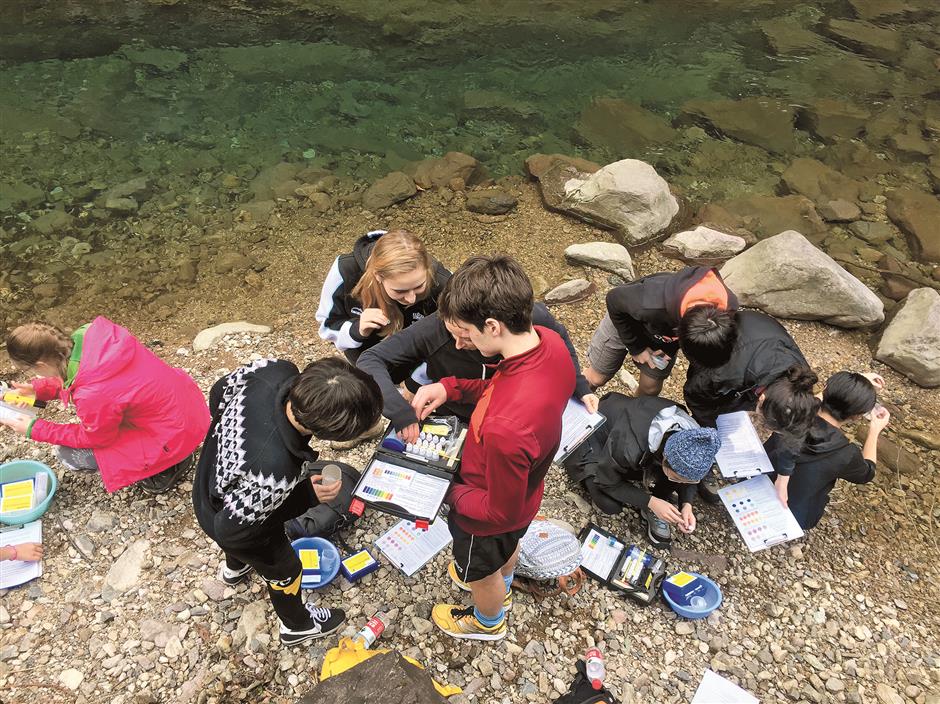
A group of Year 12 students from BISS Puxi join the biology field trip at Mountain Longwang in Anji Province.
Preparing the students for eco-friendly world
In my role at the British International School Shanghai, Puxi, I meet many students who are passionate about protecting the environment. In my experience, today’s young people are eager to both learn about and discuss current environmental issues that the world is facing. I strongly believe that all young people are able to initiate significant change in the world around them; they just need to be given the guidance and the empowerment to start.
A recent biology field trip gave a group of Year 12 students the opportunity to visit Mountain Longwang in Anji Province. While carrying out data-collection in beautiful natural surroundings, students were able to experience first-hand the environmental impact of plastics and litter, allowing them to engage in the local and global issue of the amount of plastic we use. As they were carrying out their data collection in the rivers they also collected litter, especially plastics which would have otherwise ended up in our oceans.
The field trip tied in with a student-led project within school which aimed to raise awareness for this year’s “World Water Day.” The students planned and prepared different ways to inform the school community about the importance of water conservation and empowering others to do something about it.
They also decided to raise awareness about environmental and energy-saving issues in general. In particular, they focused on the amount of “hidden water” that is required to produce everything from the food we eat to the cars that transport us around the city. Students made the point that through saving water we also save energy and vice versa. A whole-school approach was adopted for this project, covering both the Primary and Secondary campuses, with daily facts, activities, and discussions to raise awareness. One activity involved creating a water-bottle sculpture, which was made and filled with water bottles, highlighting the number of plastic bottles that are unnecessarily wasted in a school. Re-useable water bottles were sold to coincide with this installation, with the goal of raising money for the charity “Water Aid.”
We all live very busy lives and this project gave a chance for each member of the school community to reflect upon their own impact on the environment, and to realize that we can all make a difference and contribute to change. Many cross-curricular links were made with the theme of environmental sustainability and conservation, with different departments delivering a variety of themed lessons all highlighting the importance of water conservation and being eco-friendly. This really engaged our students and they were able to explore the way in which environmental issues can be understood and tackled from a wide range of academic disciplines.
It also empowered students to empower each other.
Here, one of our Year 12 students, Leo Michel-Grosjean, shares his views on the environment, and puts forward a challenge to us all: “I am strongly devoted to protecting the environment and I hope to grow up to help industries transition to a more sustainable future. Regarding climate change, I believe every action taken makes a difference. Here at the British International School, eco-friendliness and tackling climate change is greatly supported, giving me the opportunity to launch my challenge. The key is to start adopting simple habits now, which hopefully will start coming naturally. In all problems there lie solutions, and in this case the solution is so simple: don’t waste! Do not use a paper cup if you have a reusable water bottle; switch off the lights during the day and open your curtains; switch off the lights when you walk out your room or office; do not waste paper; and lastly, be more conscientious about what you buy and where it comes from. If all of you reading this article today adopt these simple actions, we can help to save the world.”
Here, one of our Year 12 students, Leo Michel-Grosjean, shares his views on the environment, and puts forward a challenge to us all: “I am strongly devoted to protecting the environment and I hope to grow up to help industries transition to a more sustainable future. Regarding climate change, I believe every action taken makes a difference. Here at the British International School, eco-friendliness and tackling climate change is greatly supported, giving me the opportunity to launch my challenge. The key is to start adopting simple habits now, which hopefully will start coming naturally. In all problems there lie solutions, and in this case the solution is so simple: don’t waste! Do not use a paper cup if you have a reusable water bottle; switch off the lights during the day and open your curtains; switch off the lights when you walk out your room or office; do not waste paper; and lastly, be more conscientious about what you buy and where it comes from. If all of you reading this article today adopt these simple actions, we can help to save the world.”
(Ling Coong)
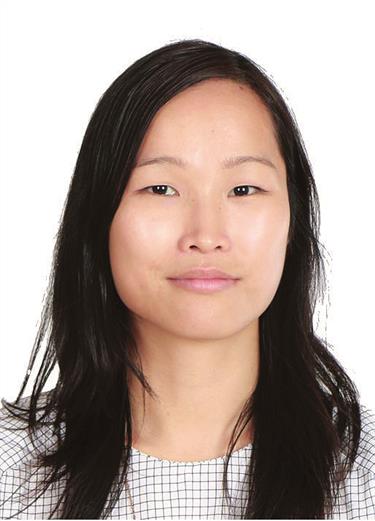
Ling Coong is CAS coordinator at BISS Puxi.
Ecology to groom student leadership
I had the privilege of joining YCIS eight years ago. When I arrived I was delighted to learn that the school already had a thriving Environment Club. Later, I inherited the administration of the club and have had the amazing experience of facilitating it year after year, all the while seeing outstanding student-led achievements come to fruition.
The club has been very active with the “Roots and Shoots” organization, which was established by Dr Jane Goodall, the world renowned British primatologist, ethologist, anthropologist, and UN Messenger of Peace. The club actively supports the group’s “Million Tree Project,” and each year YCIS students organize various activities to fund the planting of a 1,000-tree forest in Inner Mongolia. The students then travel to Inner Mongolia to help plant the trees. To date, Yew Chung has planted eight full 1,000-tree “Yew Chung Forests.” The school has been so proactive in the area of environmental protectionism that Dr Goodall herself presented the coveted “Green Star” award in 2012. The school was honored a second time last year, earning the “Valuable Partner” award by Roots and Shoots for the school’s continued dedication to ecology and environmental stewardship.
The environmental club actually ties a lot of science into our activities. Understanding conservation and the delicate balance ecosystems play in the role of supporting life on the planet helps students understand the tremendous importance of being good stewards of the environment.
Beyond this, however, the club allows students to lead and take initiative. Through the course of the student club’s maturity on campus, I no long “lead” the group. Rather, I advise and facilitate as the students plan, organize and develop initiatives entirely themselves. As an example, one of our Year 12 student-organizers is known to be reserved, but upon joining the group she has now blossomed into a confident advocate of the club and its projects. Not long ago she volunteered, along with another student, to get up in front of the audience at a concert with more than 500 attendees to announce fundraising for this year’s 1,000-tree project. She also translated her “pitch” into Mandarin! I believe this to be a fulfilment of what we aim to do here at YCIS, which is to empower students to tap into their passions, such that they have the confidence needed to be able to lead and direct projects on their own.
(Curtis Young)
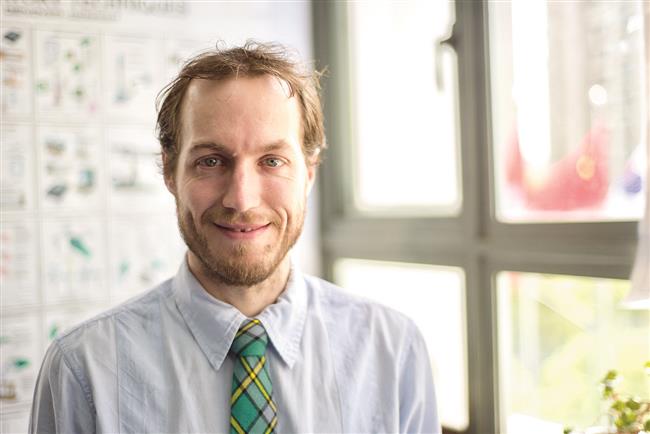
Curtis Young is Secondary Science teacher at YCIS Gubei campus.
School project that transforms lessons into real action
As an Upper School teacher of IB Biology and MYP Sciences, environmentalism is a particularly meaningful topic in my day-to-day teaching. We learn about carbon cycles to understand the significance of fossil fuel deposits used for combustion and carbon dioxide concentrations in the atmosphere. We track data that correlates atmospheric CO2 with global warming and changes to world climates and oceanic acidification. But some of my most enjoyable experiences with environmental learning have come from working with younger students, in particular as a mentor for a group of fifth graders engaging with a long-term collaborative project for their PYP Exhibition project on the environment.
The students had a good base of understanding global warming and its link to CO2 in the atmosphere, as well as people’s energy needs and issues surrounding conservation and resource management. After a period of brainstorming they identified fluorescent light bulbs in the school as an energy-consuming resource that are replaced often and disposed of frequently. Were there better, more environmentally friendly options available that would last longer and use less energy but at a similar cost? Working with these students, I found this was a question that required a lot of investigation. How much did the current light bulbs last? How expensive were they? How do we balance the economic cost of the “better” more environmentally friendly light bulbs with the benefit of less waste, less energy consumption and less carbon dioxide emitted into the atmosphere? Ideally, could we find a light bulb option that was an improvement both environmentally and financially, in the long-run?
The students came to a census of how many bulbs were in the classrooms and were surprised to find they numbered thousands. They had to find out how much the bulbs cost, how many were ordered every year, and how the more eco-friendly versions could be sourced in China. Ultimately their project will culminate in a presentation to our head of school where they will state their case for why the school should invest in this new bulb. If the students are able to crunch the numbers, explain the science, and appeal to reason, logic, and ethics, they have a great shot at seeing this learning turn into real concrete action.
(Marin Dobson)

Marin Dobson is IB Biology and MYP Science teacher at SCIS Pudong.
Kindergarteners look for signs of nature in concrete world
Lights, iPads, action!
Picture the scene. A group of kindergarten students, iPads in hands, critically examining the Early Years playground for signs of nature. At this point it became clear that exploring nature was not going to be a straightforward task. Nonetheless, our intrepid explorers sought out and revealed a bug paradise beneath the bushes surrounding the Early Years playground. This discovery of nature beneath our very feet led to the creation of a Bug Mansion outside our classrooms.
Nature was coming closer to our classrooms and the lives of the children but our colorful, bright and shiny playground was somewhat out of tune with nature. This posed an important question. What was our playground missing? The kindergarten students were determined to find out what was missing and to take action. Initially, there was a lack of interest, a feeling of being too small or too young to be heard, as if their voices were too insignificant to matter. But action comes in all sizes and with the collective voices of all the kindergarteners, that voice will be heard — and it was heard. Their voices spoke through their drawings, through their persuasive letters, through their artwork and was expressed from their hearts with a goal; the goal of bringing nature to Early Years. One insightful student commented that, “we will be in first grade when the playground is changed but the new kinder kids will see it and appreciate it.” Such a selfless approach epitomizes what we strive to develop through the IB program.
When students engage and demonstrate action in a real life situation, that has a personal significance, we as educators can pause, and smile. Our students have discovered they are the voice of change. They have discovered that their ideas are important; therefore they are important. Personally, I feel that this is our main role as educators: empowering students to take ownership over their own learning to make that experience significant and challenging.
Seeing the first graders returning to Early Years playground brought forth a reflective moment for all. Hence the cycle of plan, act, reflect comes to a natural completion.
I now pass the baton of change onto this year’s kindergarten students and I ask, what is your plan of action?
(Noel Walsh)
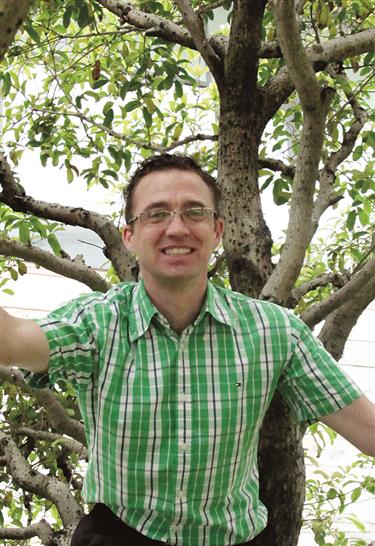
Noel Walsh is Kindergarten teacher at WISS.
Making school more eco-friendly
It’s not new, but it’s not old either. Millennials have been endlessly warned by older generations of the environmental disasters they stand to inherit. Sadly, younger generations have grown up seeing these human-instigated environmental issues as the norm. Acutely aware of the horrifying nature of these current issues, Concordia students have taken action to make their school more eco-friendly.
High school students explore sustainable solutions to global issues effecting the planet in classes such as AP Environmental Science and Applied Global Development and Public Health. That exploration spills over into co-curricular clubs as well, including the student-led Environmental Committee which takes on issues ranging from energy efficiency to animal welfare, publicly informing students about paramount environmental topics.
Around the school, the club has posted reminders to turn off lights, to print double sided and to use only one paper towel after hand washing. These signs remind the school community of the small steps we can take to benefit the environment and show how our carbon footprint can be reduced through simple daily actions.
Students do not stop at raising awareness; we encourage others to actively participate.
The Environmental Committee hosts a yearly competition between high school grade levels with the grade that collects the most scrap paper in a week being named the winner.
Concordia’s Global Issues Network is another club that focuses on various environmental issues as well as human rights and animal welfare.
(Juyeon Baik and Karen Ma are Grade 10 students at Concordia and active members of the school’s Environmental Committee.)
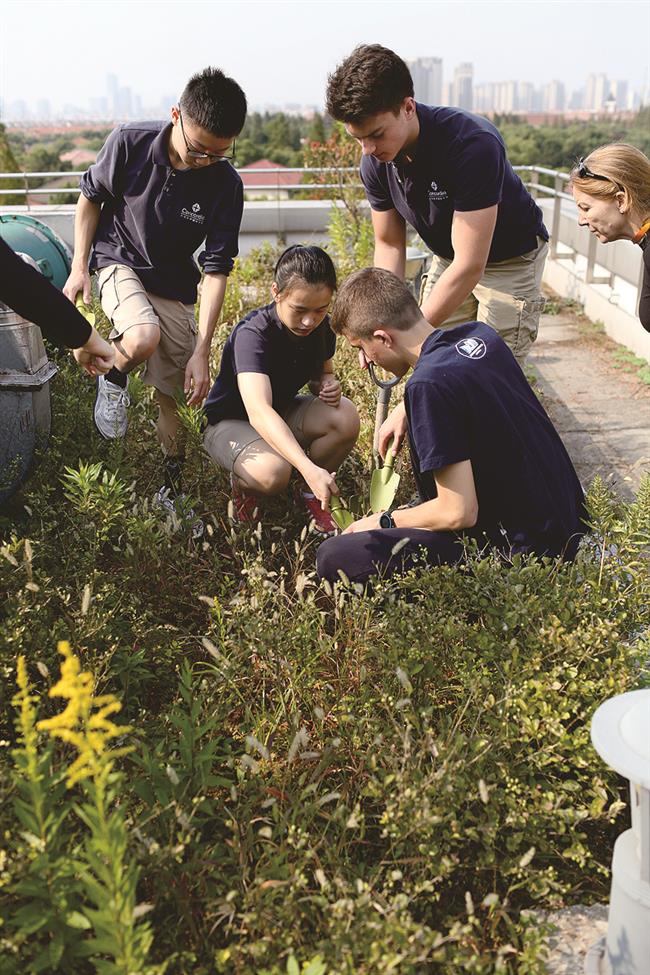
Concordia students learn ways to organically remediate the soil to better grow crops in their rooftop gardens.
Earth Week celebrated on campus
Earth Week at Shanghai American School was a campus-wide weeklong celebrations.
“Earth Week aims at raising awareness for sustainable habits for everyone,” said Noah Flesher, a first-grade teacher at our Puxi campus.
“We have pushed for some small, but great, initiatives. Last year we helped facilitate the integration of biodegradable cups, forks, and spoons in the cafeteria. Additionally, each year catering company Sodexo helps us by providing a small discount at the cafeteria for everyone who brings in a reusable cup. Another great initiative was the collection of coffee grounds from our cafe to use as fertilizer in our flower-beds. Sodexo has continued the practice this year.”
As part of Earth Week this year, there were many events organized by teachers and clubs, such as wearing green colored clothes, Kick the Single Use Habit Day, and Stash Your Trash Day.
SAS Director of Facilities, Chris Levesque, shared tips on how to be greener with all of our teachers:
? When you are asleep or out of the house, turn your thermostat back 10 to 15 degrees (for every 1 degree change you can save approximately 5 percent on your heating and cooling bills).
? Open curtains on south facing windows to allow the sun to naturally heat your home in winter, and close them in the summer to reduce solar gain.
? Turn things off when you are not in the room such as lights, TVs, entertainment systems, and computer.
? Plug home electronics, such as TVs and DVD players, into power strips; turn the power strips off when the equipment is not in use.
? Do not run the water when brushing your teeth or shaving, turn “ON” only when needed.
? Wash only full loads of dishes and clothes.
? Take short showers instead of baths.
? Air dry dishes instead of using your dishwasher’s drying cycle.
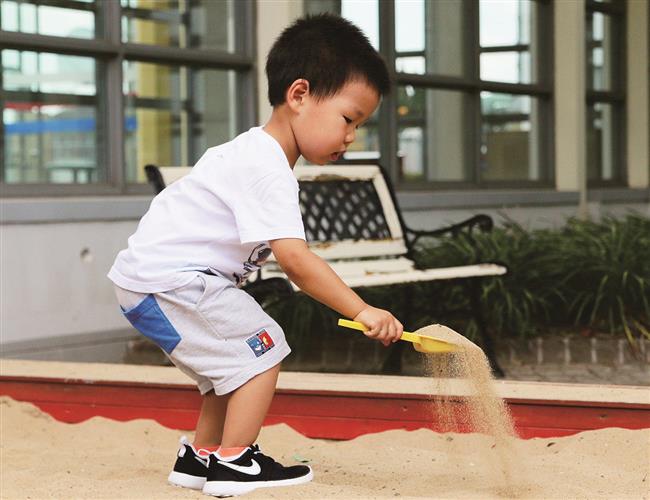
An SAS student plays with sand.















